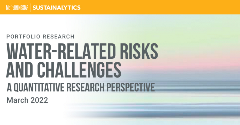Governance in Brief – March 24, 2022
Shell directors face legal action over climate change Environmental law charity ClientEarth is preparing legal action against the directors of Shell over the company's climate transition plan. ClientEarth wishes, in its capacity as a shareholder, to hold the directors personally liable for having breached their legal duties by mismanaging climate risk.
What's Happening in Sustainable Finance: ESG Market Continues Rapid Growth, Climate Risks Top WEF List, and More
We’re seeing rapid growth and diversification in the ESG market, with companies increasingly using sustainable bonds, loans, and deposits to finance emissions reductions, renewable energy, waste and water management, transition plans, and more.
Water-Related Risks and Challenges
This report sheds light on the growing effects of water scarcity on companies and countries. To address these challenges, investors can use water reporting metrics to identify companies and countries with severe water risk. We further relate water metrics to firm and country characteristics and highlight substantial cross-sectional differences.
ESG Beginner's Checklist: Action Items on Overcoming Common Obstacles
Discover some of the obstacles ESG leaders face in the early stages of their journey toward sustainability — and what you can about them—in this checklist. Is your company dealing with limited human resources, overwhelming ESG information, inconsistent communication with stakeholders, understanding the competitive landscape, or funding your ESG program?
Governance in Brief – March 17, 2022
SEC proposes heightened cybersecurity risk disclosure The U.S. SEC has proposed amendments to existing rules on public companies’ disclosure of cybersecurity, risk management, strategy, governance, and incident reporting. The amendments would, inter alia, require public companies to report on material cybersecurity incidents and periodic updates on past incidents, as well as the companies’ policies and procedures on cybersecurity risk management, board oversight of cybersecurity risks and directors’ cybersecurity expertise. SEC Chair Gary Gensler issued a statement in support of the amendments, considering cybersecurity an emerging risk that must be addressed by public companies. Gensler stated that standardized and periodic cybersecurity risk disclosure would enable investors to assess cybersecurity risks more effectively. SEC Commissioner Hester Price released a dissenting statement arguing the proposed rules would pressure companies to “adapt[] their existing policies and procedures to the Commission’s preferred approach”, while noting that securities regulators are not “best suited to design cybersecurity programs.”
Key Themes Shaping Proxy Voting in 2022
As the volume and breadth of ESG risk exposure continue to rise, the stage is set for another momentous proxy season. The trending topics of last year will continue to steer the agenda—with the prospect of even more substantial support from shareholders in 2022.
Governance in Brief – March 10, 2022
Toshiba CEO resigns amid internal opposition to planned reorganization Satoshi Tsunakawa has unexpectedly resigned from his post as Toshiba CEO, amid alleged internal opposition to the restructuring plan that will be put to vote at an upcoming March 24 EGM. Tsunakawa will stay on as interim Chairman, while senior executive Taro Shimada has taken over as interim CEO. Additionally, Toshiba has appointed two new executives.
The Sustainability Conundrum of Living Income in Agriculture
Living Income is a crucial consideration among leading companies across some sectors and their supplier companies throughout the agricultural and food supply chain. Companies that manage ESG risk in their supply chains, making targeted investments to improve their resilience, are better positioned to build investor confidence.
Answering the Call for Progress: How Companies Can Respond to Investor Demands on DEI
In this blog post we share what companies can do to communicate their progress on diversity, equity, and inclusion (DEI) to investors and other key stakeholders, particularly with respect to gender diversity and advancing women’s socio-economic status.
EU Taxonomy in Limbo - Reporting Alignment of Article 8 and 9 Funds in 2022
For observers of the EU’s Sustainable Finance Strategy, 2022 kicked off with a crack and a bang as the European Commission went ahead with plans to include natural gas and nuclear-related activities as potentially sustainable under their ‘Green Taxonomy’. However, in midst of this furor, seemingly less attention has been paid to other components of the regulation that have quietly taken effect from the 1st of January 2022, presenting their own set of challenges.
Governance in Brief – March 3, 2022
McDonald’s faces proxy fight over pig treatment Activist investor Carl Icahn has nominated two candidates to the McDonald’s board, in a proxy fight over the firm’s treatment of pigs. Icahn, who owns 200 shares of McDonald’s stock, also requests that the fast-food giant source its meat from crate-free pork suppliers within a specific timeframe.
Governance in Brief – February 24, 2022
SEC continues work on climate risk disclosure rules U.S. SEC Chair Gary Gensler has responded to criticism from senators over the delayed publication of the agency’s mandatory climate risk disclosure draft, noting that “it’s essential [that the SEC] get this right”. In a letter sent to Gensler, Senator Elizabeth Warren called for the “release of the strongest requirements possible” amid reports that the delay stems from disagreements between SEC Commissioners over whether Scope 3 emissions should be included among disclosure requirements.
The ESG Risks of National Oil Companies Taking Over Fossil Fuel Production from International Oil Majors
As growing pressure to cut GHG emissions is causing Western oil majors to sell their high-carbon assets, it is expected that National Oil Companies (NOCs) will pick up some of the production. For investors holding an interest in or considering investing in NOCs or sovereign debt, it is worth assessing how fossil fuel production shifts will impact their portfolio’s alignment with climate ambitions and ESG values.
















